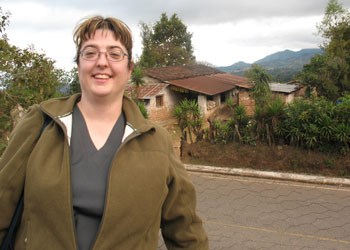Shelly Snidanko is used to helping people with their teeth. The dental technician went to villages surrounding Jalapa, Guatemala on a four day dental mission with Kindness in Action (KIA), working to bring dental care to people who normally would not be able to have it.
The mission saw 504 patients in four days, doing 695 extractions, 171 cleanings, 211 restorations and a denturist took 18 impressions for dentures or partials in four days. Snidanko says that even with all the work they did do, some people had to be turned away because there wasn't enough time to do everything that needed to be done.
The work was done in the school at the villages where she visited, Snidanko says, and people would line up before her and the rest of the team would get to work. She says that the local residents can't afford to pay for dental work, and that has lead to a huge need for volunteers to go down and help.
"We have dentists in almost every community... We don't see the cavities and decay that you see down there, for a lot of these people it's the first time they've seen a dentist in their life, I'm talking about a forty or fifty year old," Snidanko says.
Working in Guatemala presents challenges that are not present in her regular work in Canada, Snidanko reveals, with simple things like running water being unavailable.
Water was hauled from a camp to do the work, along with all the equipment that was needed. That equipment was often more limited as well, as suction wasn't available and they didn't have chairs that were as flexible as at home, often having to use tables and chairs from the schools where they did the work. One of the most difficult parts was working without suction, Snidanko says, as patients had to spit in a bag and they would dab with gauze rather than use the suction they were used to.
"The dentist is always needing a clear view to do work, just dabbing it with gauze isn't giving you the clear view the dentist usually likes," she explains.
"Going to the dental office on Monday when I came back was strange because we stood. I stood for the eight hours when we working, so coming back on Monday having a seat beside the chair was kind of strange."
She also says she wishes that she knew more Spanish, in order to talk to and reassure patients, who were often nervous at the first time at the dentist. She says they were able to overcome the language barrier, but knowing more would have been an asset.
While it was more difficult than working at home, Snidanko says she would not hesitate to go again, and is already planning on making another trip next year, and continuing to do this work as long as she is able.
"I always wanted to go along on a mission, I always wanted to do something more with my career. I can't build houses, but I can do dental work. I've been a dental assistant for 12 years, and I always thought if I could do something with my dental skills that helps people, more than just working in a private office in Canada, I wanted to do that," she says.
The mission also showed people in the country basics of oral hygiene, which Snidanko says is one of the long-lasting effects of the trip. She notes that if they can get more people brushing, they can prevent some of the damage that they were seeing in people who had never been to the dentist, and improve the health of people in the country.
She also encourages others to get involved in the dental missions, saying it's a very rewarding experience. She says that even people without dental training can help and were just as important, because it allowed her to focus on the dental work. Those without dental training did important tasks like sterilizing instruments and directing the people in the clinic. She recommends anyone interested in helping out visit www.kindnessinaction.ca.




